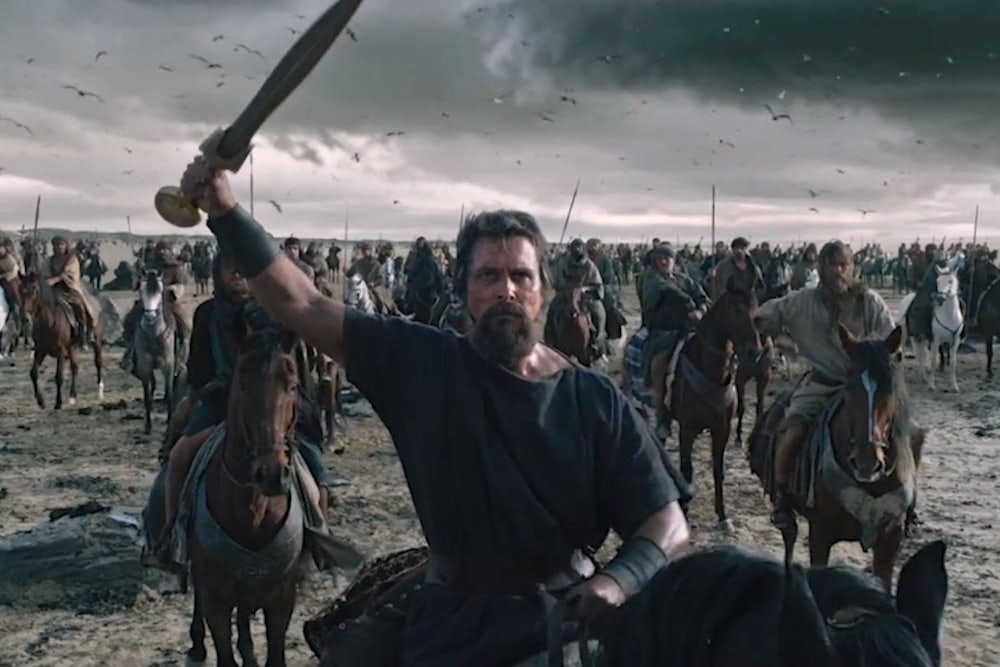Everyone knows that 2014 is supposed to be the Year of Bible Movies. Back at the end of 2013, the Telegraph's Nick Allen wrote a story that predicted “Biblical films’ Hollywood comeback.” “Superheroes,” the headline claimed, “are being elbowed out by Noah and Mary as Hollywood makes 2014 the year of the Biblical epic.” Allen mentions Noah and Exodus: Gods and Kings as part of a “series of unashamedly Christian biblical epics” coming this year.
The Daily Beast’s Andrew Romano traced the trend to the star reality-TV producer Mark Burnett, whose History Channel miniseries "The Bible" was so popular that Burnett, a devout Christian, was inspired to create the Jesus movie Son of God, released in February. NPR noted in March that Noah, Son of God, and Exodus constituted “a flood of biblical proportions this year in Hollywood,” and the Hollywood Reporter kept the story going. “Easter weekend provided further evidence that 2014 is indeed the year of the Bible movies.” (Heaven Is for Real, Noah, and God’s Not Dead were all in the box-office top 10 that week.)
But lumping together all Bible movies borders on laziness. “Bible” is not a synonym for “Christian,” or even for “faith-based.” The Bible is source material, like Shakespeare or Greek mythology or even Marvel Comics. The Telegraph called 2014’s lineup “an unprecedented overture by Hollywood to America’s evangelical heartland.” They must have missed the fact that Noah is unashamedly Jewish. The difference between a movie made for religious motivations—like Son of God, Heaven is for Real, and God’s Not Dead—and movies that just happen to be based on Bible stories, like Noah and Exodus, is as dramatic as the difference between The Passion of the Christ and The Last Temptation of Christ. In fact, even the differences between Noah and Exodus are so dramatic as to make it strange to keep seeing them paired in trend stories.
Noah is not a “Bible movie” but a Darren Aronofsky movie. (The auteur director tried to help audiences along by calling his film “the least Biblical movie ever made.”) Likewise, Exodus is not a Bible movie but a Ridley Scott movie. It is hard to imagine two directors treating the source material more differently. Aronofsky is an auteur who had been parsing the story of Noah, Midrash-style, for years with his screenwriting partner, Ari Handel, and finally got the chance after Black Swan to go big. Scott has been a superstar rainmaker since he made Alien in 1979, and has made a career out of appealing to the broadest possible audience.
The story of Noah from Genesis is part of the Bible’s mythological pre-history, without form and void, allowing Aronofsky to use his imagination to populate his pre-flood universe with strange creatures. Exodus, on the other hand, offers Scott the distinct storytelling challenge of being set in a discernible time and place: Egypt, 1300 B.C.E.
But that’s just fine for Scott. His gods are Hollywood gods, and they require over-the-top tribute. Aronofsky’s Noah was a big-budget movie, too, but it still showed the director’s low-tech aesthetics. To convey the vision of Creation pulsing through Noah’s brain, he used some of the same trippy visuals in Noah that he did in Requiem for a Dream. Scott’s most obvious inspiration for Exodus, Cecil B. DeMille’s 1956 epic The Ten Commandments, was at the time the most expensive movie ever made. So Exodus must be just as visually dazzling, accounting for technological inflation. In that, the movie does not disappoint.
Everything in Exodus is just what the Bible says it is, only more so. A plague of frogs is really a plague of frogs. Which means everyone, including the Pharoah’s wife, will be shown completely covered in frogs. A giant crocodile emerges out of the muddy Nile waters and attacks another, spreading blood through the waterways until all the rivers run completely red. I can’t tell you about the parting of the Red Sea because the effect is so spectacular that revealing it would count as a spoiler.
The visual differences between an Aronofsky movie and a Scott movie lead to major substantive differences. Aronofsky’s God in Noah was invisible, and he used God’s power to occasion a moral dilemma for his characters: Is killing so many people by drowning right, or should Noah be merciful and save a few? Scott, in an uncharacteristically minimal choice, depicts God as a young boy (Isaac Andrews), clad, monk-like, in gray robes, appearing here and there without much fanfare. The young actor's furrowing brows can contain fiery Old Testament wrath, but if he is feeling more innocent, he will do something like making Moses a pot of tea.
Aronofsky and Handel have been up front about the message of their movie, which has to do with humanity’s responsibility to take care of Earth. The biggest moral scene in Exodus, however, is probably its least dramatic, especially compared to The Ten Commandments. We see a night aerial shot of Hebrews dancing around fires, only mildly heathen-like. And then we’re in a cave close-up with God and Moses, who is carving letters in stone with a hammer and chisel, workmanlike. God tells Moses he hasn’t got long to live, which is why he should write down “these laws,” so that his people can have something to refer to after he’s gone. Moses nods, goes back to hammering. There's no golden calf, no "thou shalt"s, and Moses never says, “There is no freedom without the law!”
